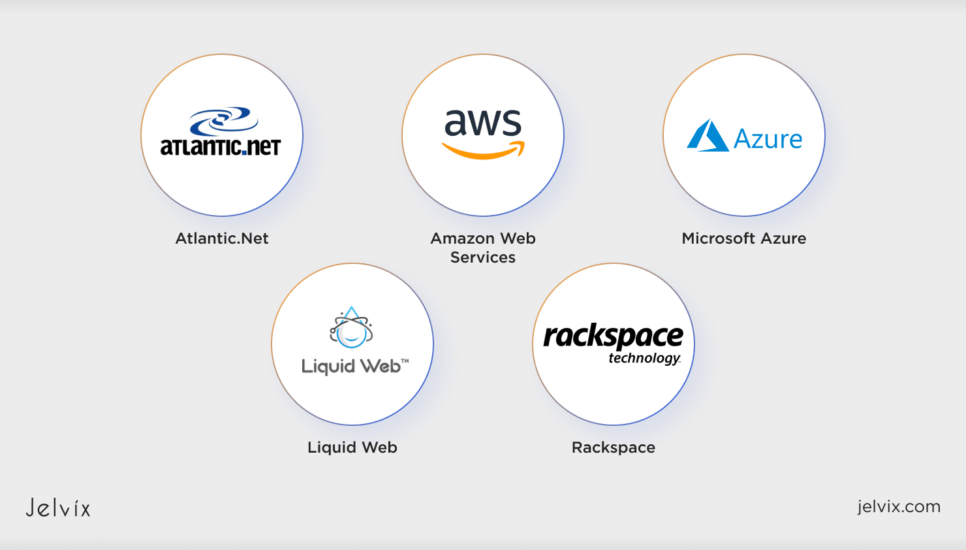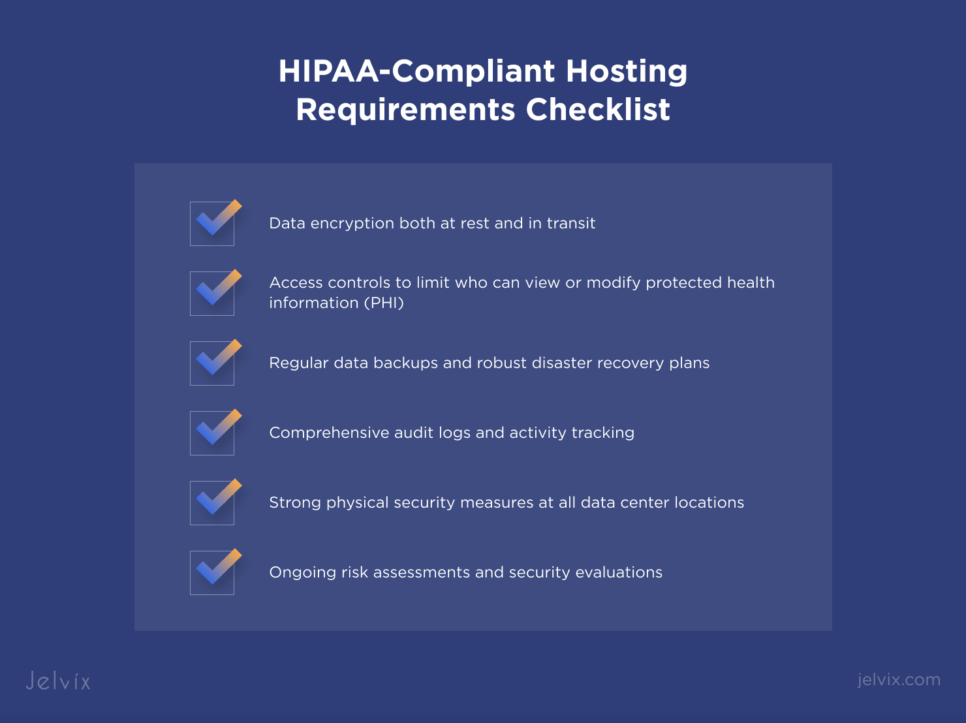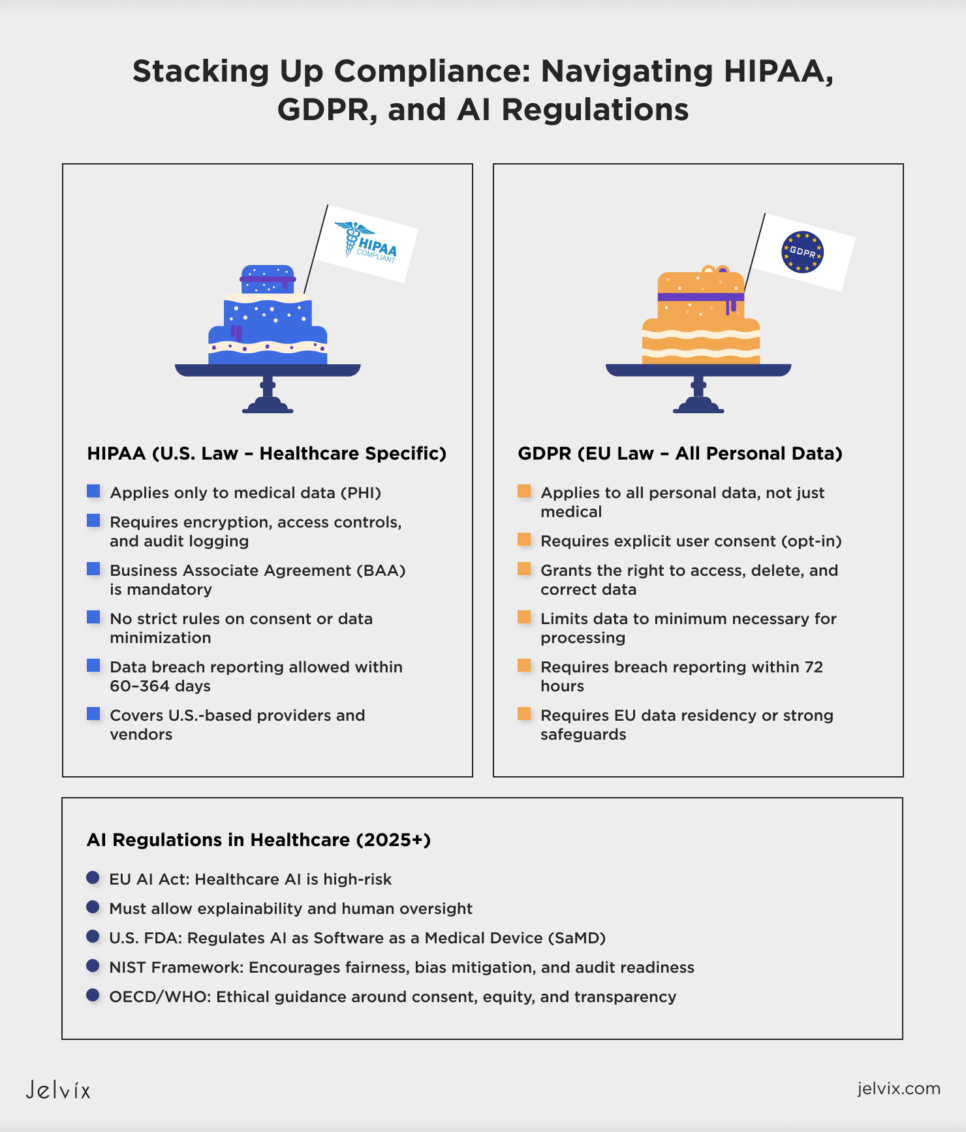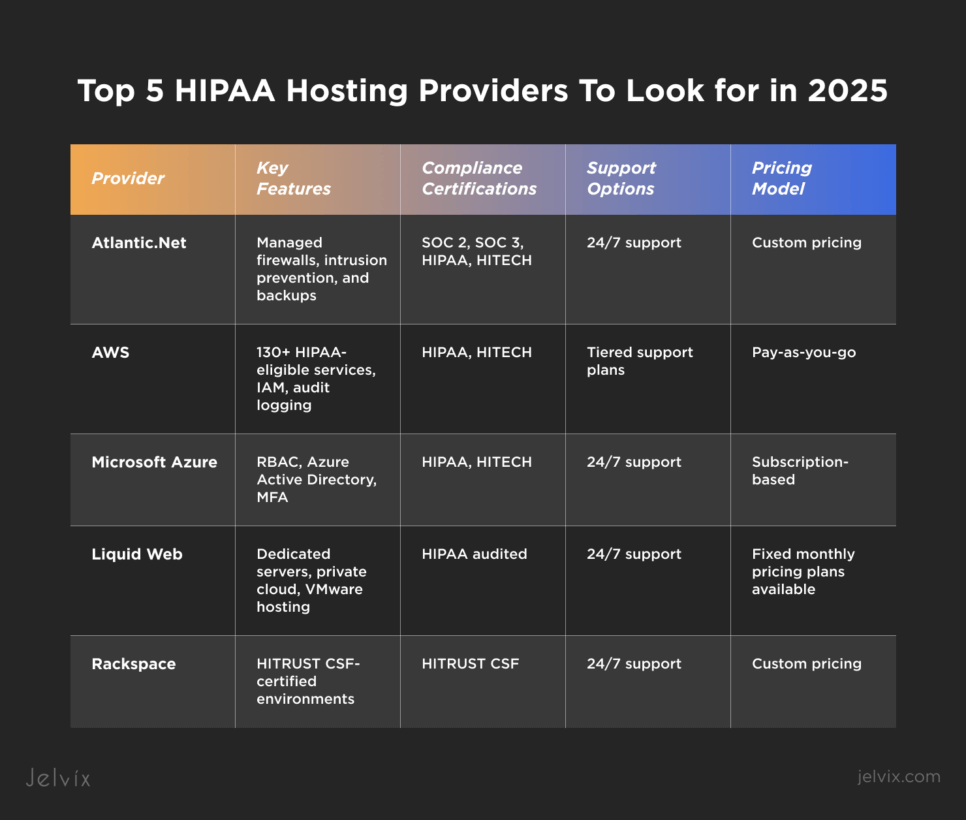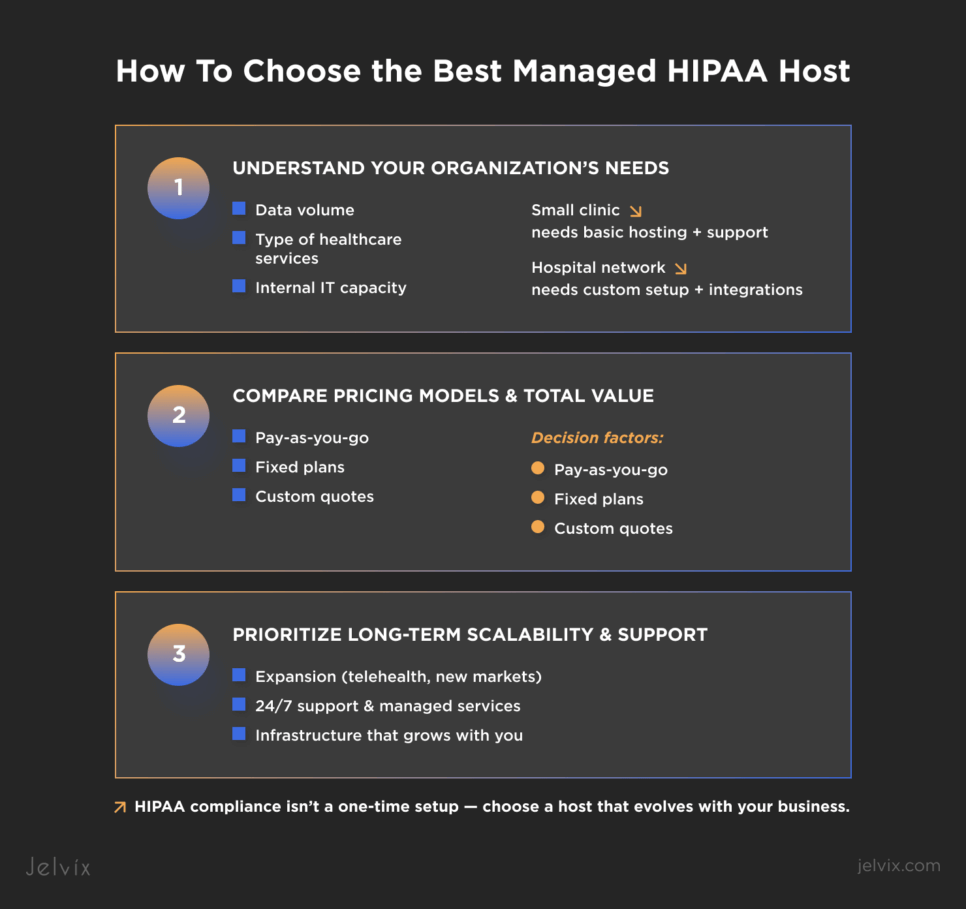When it comes to handling patient information, you must take care of privacy above all else. The HIPAA controls how medical data is stored, accessed, and shared, especially when it comes to custom enterprise software development.
If you’re building a healthcare product or handling patient data, your hosting environment can make or break your HIPAA compliance.
In this guide, we compare the top HIPAA-compliant hosting providers and explain what security features, certifications, and contracts (like the BAA) you must look for—including how to meet HIPAA data backup requirements—to stay regulation-ready in 2025.
What Is HIPAA-Compliant Hosting?
HIPAA hosting refers to web and data hosting services that comply with the strict requirements of the HIPAA privacy and security rules. These services are designed to protect sensitive health information at every step.
To be truly HIPAA-compliant, a healthcare hosting provider must fulfill specific HIPAA cloud storage requirements:
- Data encryption at rest and in transit;
- Access controls for limiting who can view or change data;
- Regular backups and disaster recovery plans;
- Audit logs and activity tracking;
- Physical security for data centers;
- Ongoing risk assessments.
Without these features, you’re at risk, even if the rest of your system is secure.
The Role of BAA in HIPAA Server Security and Compliance
One of the most critical pieces of HIPAA compliance is the Business Associate Agreement. A BAA is a legal document that confirms your hosting provider understands their responsibilities under HIPAA and agrees to handle protected health information accordingly. When choosing a hosting provider, always confirm if they offer a BAA for HIPAA compliance.
Healthcare Data Protection Regulations in the US and EU
If your organization uses wearable technology in healthcare or any other tools that store and process patient data, you need to follow strict data protection rules.
“We have 31 health systems across the United States [that] represent about 18% of all of the clinical encounters that take place in the United States every day,” says Terry Myerson, CEO of Truveta. “So it’s a tremendous volume of data.”
Whether you operate in the U.S., Europe, or globally, understanding the differences between HIPAA and GDPR is key to staying compliant and avoiding severe penalties.
The US Data Privacy Laws
The Health Insurance Portability and Accountability Act safeguards patient health information in the US. It applies to hospitals, clinics, insurers, and third-party vendors (like hosting providers) that handle protected health information.
HIPAA requires end-to-end data encryption, role-based access controls, audit logs, physical and network security, and BAA. It is more focused on healthcare data, but it’s less strict in terms of consent and user control.
European Privacy Laws
The General Data Protection Regulation applies to all personal data for EU residents, regardless of industry. If you’re a US-based provider offering healthcare mobile app development or other services to European users, GDPR still applies.
Key requirements of GDPR regulations include informed user consent, the right to access and delete information, data minimization (only collect what you need), breach reporting within 72 hours, and data storage within approved regions unless special safeguards are in place.
Why HIPAA and GDPR Matter for Hosting
If your hosting provider doesn’t understand the nuances of both HIPAA and GDPR, you could face compliance gaps, even if your software is secure. The best HIPAA web hosting partners offer data centers, encryption, and access controls that meet both U.S. and EU standards, giving your organization peace of mind.
Beyond HIPAA and GDPR: Emerging AI Regulations in Healthcare
As AI in healthcare becomes more involved in diagnosing diseases, personalizing treatment, and automating patient interactions, regulatory bodies are introducing AI-specific frameworks to ensure these technologies remain safe, ethical, and fair. These are not fully established laws yet, but they are increasingly referenced in policy development and investor due diligence.
EU AI Act
The EU AI Act classifies AI systems by risk level, with most healthcare AI labeled as “high-risk.” These systems must undergo rigorous risk assessments, offer explainability (you must be able to justify AI decisions), maintain human oversight, and prove data quality and bias mitigation. The Act also mandates real-time monitoring and post-market reporting for AI in clinical use.
U.S. FDA’s AI/ML Software Oversight
In the U.S., the FDA regulates many AI tools, such as Software as a Medical Device (SaMD). If an AI tool supports clinical decisions, it often needs 510(k) clearance, De Novo classification, or premarket approval.
The FDA also issued an AI/ML Action Plan, which pushes for algorithm transparency, real-world performance monitoring, and a “Predetermined Change Control Plan” for continuously learning algorithms.
NIST AI Risk Management Framework
The U.S. National Institute of Standards and Technology (NIST) released the AI Risk Management Framework, which offers strong guidance. It promotes fairness and explainability, secure AI deployment, and management of systemic and reputational risks. It’s often used by healthcare organizations to prepare for stricter audits or future regulations.
OECD and WHO Guidance on Ethical AI in Health
Global institutions like the OECD and WHO have issued non-binding guidelines urging developers and healthcare providers to prioritize patient autonomy and consent, ensure equity and inclusiveness, and prevent algorithmic bias.
Explore the key differences between public, private, and hybrid cloud models to determine which solution best fits your business needs and drives growth.
Evaluating Hosting Providers Based on Healthcare Data Security
Choosing the right HIPAA-compliant hosting provider means making sure your patient data is secure, your systems are reliable, and your medical app development efforts are risk-free. The Jelvix team suggests following a few criteria to pick the best provider.
Security Measures That Protect Patient Data
A strong HIPAA web hosting provider will offer encryption for data in transit and at rest, along with advanced firewalls, intrusion detection systems, and multi-factor authentication. These safeguards help protect against cyber threats, data leaks, and downtime. Regular backups and disaster recovery plans are also essential to ensure small business HIPAA compliance.
Compliance Certifications That Prove Trustworthiness
Industry-recognized certifications like SOC 2 Type II, ISO/IEC 27001, and HITRUST show that a provider meets rigorous security and privacy standards. These prove that the provider has been independently audited and follows best practices that align with HIPAA requirements.
Support and Managed Services for Peace of Mind
Look for providers that offer 24/7 technical support, managed services for system updates and monitoring, and access to compliance specialists. This kind of support helps you stay audit-ready and reduces the burden on your internal IT team, especially during busy or critical periods.
Scalability, Reliability, and Long-Term Performance
Your hosting solution should be able to scale as your organization grows. That means reliable performance, high uptime (99.9% or higher), and infrastructure that can expand without disruption. A good provider will offer systems that are both stable and flexible, so you’re ready for whatever comes next.
Top 5 HIPAA Hosting Providers To Look for in 2025
Selecting the right HIPAA-compliant hosting provider is crucial for healthcare organizations aiming to safeguard patient data, ensure compliance, and maintain operational efficiency. There are at least five providers worth trying for modern businesses.
Atlantic.Net
Atlantic.Net offers HIPAA hosting solutions that are SOC 2 and SOC 3 certified, as well as HIPAA and HITECH audited. Their services are designed to secure and protect critical health data, electronic protected health information, and medical records.
Key features of Atlantic.Net include fully managed firewall solutions, advanced intrusion prevention services, encrypted VPNs, and daily backups.
Pros: Comprehensive security measures and compliance certifications.
Cons: May be more suitable for organizations with specific compliance needs.
Amazon Web Services
AWS provides a secure environment for processing, maintaining, and storing protected health information (PHI). They offer a Business Associate Addendum to customers, enabling HIPAA compliance.
Speaking about core features, you can expect to get access to over 130 HIPAA-eligible services, end-to-end encryption, identity and access management, and audit logging.
Pros: Scalable, enterprise-grade cloud healthcare hosting with a global footprint.
Cons: Complex configurations may require technical expertise.
“AWS offers a HIPAA-eligible environment, meaning it provides services that can be used to store, process, and transmit PHI—but only if configured correctly,” says Ajay Varma, Senior Product Manager at CSPO.
Microsoft Azure
Microsoft Azure offers HIPAA-compliant services through a BAA. Azure has implemented the physical, technical, and administrative protection required by HIPAA and the HITECH Act.
The core features include role-based access control, Azure Active Directory for identity management, multi-factor authentication, and comprehensive monitoring tools.
Pros: Integration with Microsoft services and strong compliance support.
Cons: May require careful configuration to ensure compliance.
Industry experts highlight: “HIPAA requires access controls to be implemented to limit who can access PHI. Azure offers these controls and uses Active Directory to allow permissions to be set. Multi-factor authentication can also be added.”
Liquid Web
Liquid Web provides HIPAA hosting solutions with managed dedicated servers, private cloud hosting, and VMware hosting. Their infrastructure is designed to meet HIPAA guidelines.
Key features of Liquid Web include locked server cabinets, data encryption, intrusion detection systems, and 24/7 support.
Pros: Tailored solutions with high reliability and performance.
Cons: Pricing may be higher compared to other providers.
Rackspace
Rackspace offers HIPAA-compliant hosting with HITRUST CSF-certified dedicated environments. They provide tools for cloud hosting, managed services, and IT infrastructure management.
Among the most essential features are HITRUST CSF certification, dedicated hosting environments, and comprehensive IT protection for sensitive information.
Pros: Expertise in compliance and robust security measures.
Cons: May involve higher costs and limited customization.
Comparison Table of the Top HIPAA Hosting Services
The comparison table below aims to assist healthcare organizations in selecting a hosting provider that aligns with their compliance needs, technical requirements, and budget considerations.
Discover how blockchain technology enhances business security and drives growth by providing transparent, tamper-proof solutions across industries.
Selecting the Best Managed HIPAA Host
Once you understand your options, the final step is choosing the provider that best fits your healthcare organization’s goals.
Start with Your Organization’s Specific Needs
Think about the type and volume of data you handle, the services you offer, and your internal IT capacity. For example, a small clinic may only need basic HIPAA hosting with support, while a hospital network might require custom infrastructure, advanced analytics integration, or support for multiple applications and users. The more clearly you define your use case, the easier it will be to narrow down the right platform.
Factor in Budget and Pricing Models
Some providers offer flexible, pay-as-you-go cloud pricing, which is great for startups or growing teams, while others use fixed plans or custom quotes for dedicated environments. It’s important to weigh not just the monthly cost, but also the total value. Consider what kind of uptime, customer service, and included features you are getting for your investment.
Consider Long-Term Support and Scalability
HIPAA compliance is an ongoing responsibility. That’s why your healthcare hosting provider should offer more than infrastructure. Look for a partner with reliable support, managed services, and the ability to scale as your organization grows. Whether you expand into telehealth, add new services, or move into international markets, your HIPAA web hosting solution should be able to keep up without disruption.
Conclusion: How To Pick Properly Managed HIPAA Hosting for Your Needs?
The provider you select will directly impact how securely you store patient data, how easily you pass audits, and how smoothly your systems perform as your business grows. As you narrow down your options, focus on what truly matters: proven security, clear compliance documentation, responsive support, and the flexibility to scale.
And while HIPAA compliance is critical, the real value comes when your HIPAA hosting provider also understands the bigger picture of health tech, such as interoperability, analytics, patient experience, and care delivery.
That’s why working with a trusted tech partner can help you turn disconnected requirements into a unified and results-driven system built for both security and growth.
Still unsure which provider is right for your use case?
Contact us for a free HIPAA hosting consultation tailored to your infrastructure and risk profile.
FAQ
What makes a hosting provider HIPAA-compliant?
A HIPAA-compliant hosting provider meets strict security standards for storing and transmitting protected health information. This includes encryption, access control, audit logging, and signing a Business Associate Agreement (BAA) to formally accept legal responsibility for data protection.
Is HIPAA-compliant hosting required for all healthcare websites and apps?
Yes, if a website or app collects, stores, or transmits PHI, HIPAA-compliant hosting is required by law. This applies to hospitals, clinics, insurers, and third-party vendors handling healthcare data in the U.S.
How does HIPAA hosting differ from standard cloud hosting?
HIPAA hosting includes enhanced security, audit tracking, and strict access controls. It also requires a signed BAA. Standard cloud hosting may offer strong features, but it doesn’t mean compliance with HIPAA regulations or include legal safeguards.
Can a hosting provider guarantee HIPAA compliance?
No provider can guarantee full HIPAA compliance alone. They provide the infrastructure, but ultimate responsibility lies with your organization. You must configure, monitor, and manage the environment according to HIPAA rules.
Which is better for HIPAA compliance: AWS, Azure, or a specialized provider?
AWS and Azure offer HIPAA-eligible services and scalability, but often require technical expertise. Specialized providers offer turnkey compliance and support. The better option depends on your team’s resources and project complexity.
What should I consider when choosing a HIPAA-compliant hosting provider?
Evaluate security features, compliance certifications, support availability, and scalability. Also, confirm the provider will sign a BAA to fit your needs and can grow with your entity.
Looking for a dependable development partner?
Collaborate with a team that aligns with your business objectives and drives tangible outcomes.

